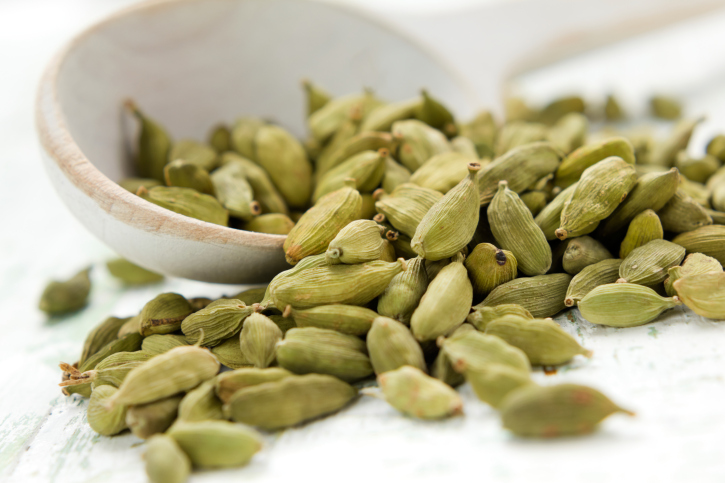We’ve entered that time of year where it doesn’t matter which way you look, there’s spiced everything! Usually when we start to see the spiced (generally pumpkin) everything, people think of Clove, Cinnamon, or Nutmeg. And while those are all great spices they can be a little overdone this time of year.
But for those of you looking to diffuse a lovely spicy oil-one that’s not quite so overdone- Cardamon essential oil might just be the ticket! Indian Cardamon has a lovely warm, sweet and spicy aroma, kind of like a comforting Fall hug!
Cardamon essential oil, also called by it’s Latin name Elettaria cardamomum, is distilled from the dried seeds of the Cardamon plant, which is a perennial herb that can grow up to 4 meters (13 feet) tall. While this herb is native to Asia- where it likes to grow wild. It is also cultivated in India and Ceylon. This herb has long, green silky blade like leaves and small yellow flowers with violet colored tips. Following the flowers, grey oblong fruits form, which contain many seeds. The very seeds that get dried and then distilled to extract the essential oil from.
Indian Cardamon has a spicy, sweet and warm aroma, whereas some inferior oils tend to have a harsher aroma with a hint of Eucalyptus.
Throughout ancient times Cardamon was very well known and used extensively in perfumes, as incense and even chewed on to help whiten teeth! The Romans used to use it to help soothe upset stomachs after having over-indulged. And Hippocrates always recommended Cardamon for coughs, sciatic nerve pain, abdominal pains, nervous disorders, and spasms. In Chinese and Indian medicine it has been used for over 3000 year for a variety of different ailments. Especially for fever, digestive complaints and pulmonary disease. These days it’s used pharmaceutically for stomach acid and laxative preparations, as well as to form a compound used to flavor certain pharmaceuticals. Talk about versatile!
One place you’re likely to have seen it a lot is as a fragrance compound in various soaps, body care products, cosmetics and even perfumes- mostly in oriental fragrances.
It’s interesting to note that it wasn’t until 1544, that the essential oil of Cardamon was first distilled by Valerious Cordus.
Precautions: Non-toxic, non-irritant, non-sensitizing. No known precautions.
Given the herbs historic uses, it’s no wonder that the essential oil bears many similar uses. For example, your respiratory system stands to benefit immensely as this oil is a very effective expectorant and great for chronic bronchitis. Considering it’s impressive anti-inflammatory and anti-spasmodic properties, it also makes this a go-to essential oil when dealing with sore, tired muscles and joints as well as angry sciatic nerves.
Hippocrates was certainly on point for using the herb for a wide variety of stomach complaints. So perhaps next time you’re experiencing nausea, heartburn, or gastric spasms, try applying some diluted Cardamon essential oil topically for quick relief.
One thing the herb doesn’t seem to have been used for in the past, is the relief of mental fatigue, nervous exhaustion, concentration, and clarity. Cardamon essential oil on the other hand, is a fabulous remedy for all these things. So adding a few drops of Cardamon essential oil to your diffuser doesn’t just make the room smell cozy, spicy and sweet like Fall, but it can also be just what you need at the end of a long day.
Have you used Cardamon essential oil in the past? What did you think of it?
*Please note that all essential oils are extremely potent and need to be respected. Always make sure you dilute the oils you use. You also don’t need a lot of the oil to reap it’s benefits and it’s always wise to err on the side of caution, especially when using oils on or around small children, elderly or people with underlying health conditions. When in doubt, always consult a Certified Aromatherapist before use.*
